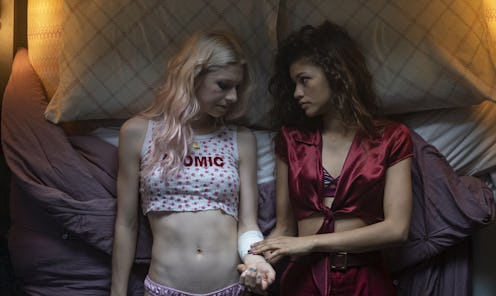
The 2020 Golden Globe nominations were announced on Monday, Dec. 9, bringing a whole lot of celebration and disappointment to a typical Monday morning. And one particularly heartbreaking reveal was Euphoria's 2020 Golden Globes snubs. The beloved HBO breakout show received a grand total of zero nods from the Hollywood Foreign Press Association. Even lead star Zendaya, who received immense praise from fans and critics alike for her portrayal of teenage drug addict Rue Bennett, was nowhere to be found. And the series' lack of recognition is reflective of how the stories of teenagers, and young people of color in particular, are largely ignored by mainstream Hollywood award shows.
The show's failures to garner Globes nominations is not for lack of support or success. Euphoria was an undeniable ratings hit, drawing praise (and a little controversy) for its raw, unabated portrayal on the issues that affect teenagers today, even if they were very taboo. On Dec. 8, just one day prior to the Globes nomination announcement, Zendaya received a Critics Choice nod for Best Actress in a Drama Series, making her Globes snub all that more upsetting and perplexing.
Of course, fans of the show are taking the loss to heart, expressing their outrage about the lack of nominations, and Zendaya's snub specifically, on social media.
Another notable snub this year at the Globes was the lack of nods for Netflix's hard-hitting and highly acclaimed mini-series When They See Us, which tells the story of the five men who were falsely accused for a 1989 Central Park attack, now known as the Exonerated Five. Actor Jharrel Jerome even took home the Emmy for Best Actor in a Limited Series for his role in the show, making the Globes snub especially egregious. Like Euphoria, When They See Us was a critically acclaimed show about young people of color. And fans are starting to see a trend.
While the Golden Globes delivered many unforgivable snubs (no love for female directors, again), the lack of recognition for Euphoria and When They See Us in particular is representative of how important coming-of-age stories, involving real issues for teenagers, are left by the wayside when it comes to award shows. Euphoria is packed with stunning performances by a diverse cast of young people of all sizes, genders, sexualities, and cultural backgrounds. It shines a light on the trials and tribulations of teenagers in a thoughtful and impactful manner, blazing a trail by even addressing these problems in the first place. Its outright snub not only seems unjust, but it's simply outdated.
The issue can also be summed up like this: When the emotionally devastating stories of Euphoria and When They See Us (among others), are ignored, it shows where the HFPA's priorities lie. It's obviously not with young people of color, and people are taking notice.
If the Golden Globes want young viewers to tune into their broadcast every year, they should recognize what those teens actually watch and talk about on social media, which are shows about themselves, that they see themselves in. Their failure to do that isn't reflective of young people's tastes, but in their own inability to keep up with the times.